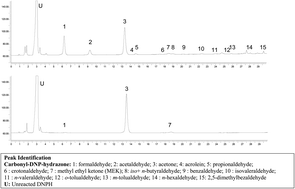Biases in ketone measurements using DNPH-coated solid sorbent cartridges
Abstract
Biases associated with carbonyl measurement using active air sampling through a 2,4-dinitrophenylhydrazine (DNPH)-coated solid sorbent cartridge following the U.S. EPA Method TO-11A are known but have not been fully investigated. Ketones are less reactive than aldehydes in the derivatization with DNPH, resulting in poor collection efficiency. Field studies and laboratory experiments demonstrate the uncertainties associated with two ketones (i.e., acetone and methyl ethyl ketone [MEK]). Ketone collection efficiencies are inversely related to relative humidity (RH), sample flow rate, and sample duration. Since water is a product in the bidirectional derivatization of carbonyls, the reverse reaction competes with the forward reaction as RH increases. Laboratory experiments demonstrate that ∼35–80% of the ketones can be lost for RH > 50% with a single DNPH cartridge at a temperature of 22 ± 2 °C. Optimal sampling flow rates and sampling durations under high RH need to be determined in various environments to ensure tolerable collection efficiencies.


 Please wait while we load your content...
Please wait while we load your content...